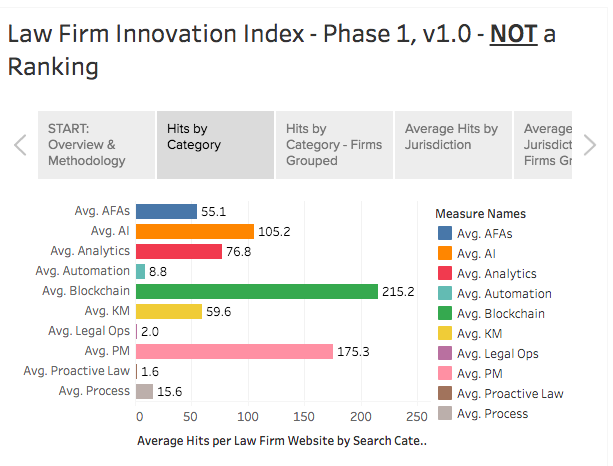When it comes to technology, the legal industry has not always been considered as being at the forefront of innovation. That stereotype may be changing, however, with the recent production of a legal innovation index.
In August 2017, Daniel W. Linna Jr., Professor of Law in Residence and the Director of LegalRnD at Michigan State University College of Law, released the Law Firm Innovation Index – Phase 1, Version 1.0. It’s intended, he said, to be a starting point, a “minimum viable product” and not a ranking of law firms.
The goal of the legal innovation index is to go beyond standard measures of innovation in the legal industry, like innovation awards or legal industry surveys, and provide a different viewpoint on law firm innovation.
Linna’s methodology used Google Advanced Search on the websites of 260 law firms worldwide, specifically those in the Am Law 200, Canadian Top 30 and Global 100. The search included words and phrases that related to the legal industry that would connote innovation: “alternative fees,” “knowledge management,” “artificial intelligence,” “legal operations,” “blockchain,” “automation basics” and “project management.”
Linna acknowledged that there were weaknesses in his methodologies. He outlined many of them, including scenarios like if a law firm discusses in depth a particular concept on its website, but in practice is not participating in that concept. This could go both ways: Perhaps a firm practices a particular concept frequently, but it does not account for it on its website at all.
The professor stated that the index is a good benchmark and starting point for a conversation about law firm innovation. Law firms have become more technologically savvy.
Law firms also understand that running a firm like a business and allowing individual attorneys to develop skills that fall outside the required expertise can help both firms and attorneys stand out from the competition.

It’s interesting that blockchain and AI ranked as high as they did because there’s still a great deal of early learning and development taking place in the legal industry around blockchain and AI. It’s possible these are more aspirational concepts rather than concepts currently in practice at firms. Regardless, it shows firms’ forward-thinking and that they have their finger on the pulse of technology.
Proactive law, legal ops, and automation scored the lowest on the index. Automation ranking as low as it did is especially curious as it’s usually considered when discussing the use of AI, which was one of the top three ranking concepts. Legal ops is a concept that’s taking off in the corporate legal world (seen through organizations like CLOC) but is clearly less of a focus for law firms.
The index also considered the popularity of concepts by jurisdiction and type of firm (Am Law 100, Global 100, etc.). Some of the trends seen in these graphs include:
- The Am Law 1-50 are very focused on blockchain
- The Global 100 rank high project management and AI
- Project management and AI are more popular in the United Kingdom
- In the United States, blockchain and project management are more popular
- Knowledge management is popular in the United States with the Am Law 51-100
Overall, it’s very encouraging to see the industry focusing on indexes like this. It may not be perfect, but it continues the conversation on the future of practicing law and the technology that supports it.



